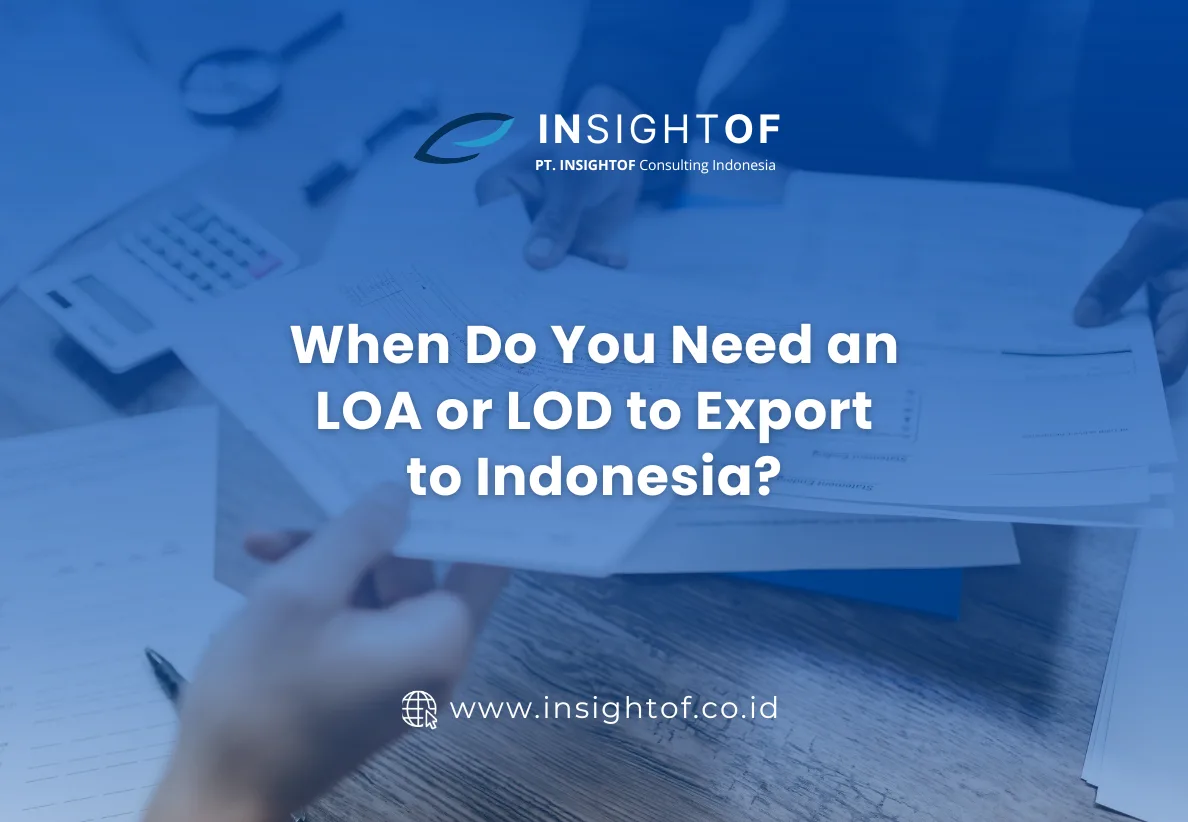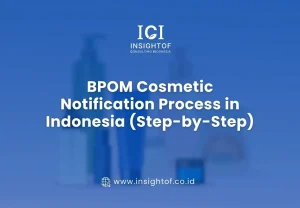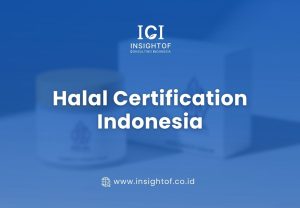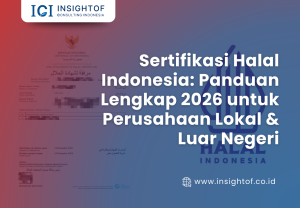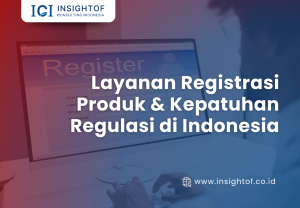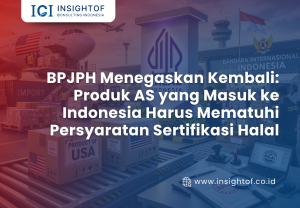What Is a Letter of Appointment (LOA)?
A Letter of Appointment (sometimes called Letter of Authorization) is a formal document from a foreign manufacturer or brand owner appointing an Indonesian importer/distributor as its authorized agent. In practice, export products into Indonesia – whether food, cosmetics, or health supplements – require local registration. Indonesian law insists that any importer be officially recognized by the product owner.
For example, BPOM’s food-import rules explicitly list a “Surat penunjukan (LOA) yang disahkan oleh notaris, kamar dagang setempat, atau perwakilan RI di luar negeri” as a requirement.
In other words, the LOA must be on company letterhead and signed by an officer of the foreign company. It must also be legalized, either notarized or attested by an Indonesian consulate. The LOA typically names the product(s) and packaging (e.g. “Brand X Vitamin Supplements, bottles of 60 tablets”). It states that the named Indonesian company is the official distributor.
In Indonesia, imported packaged foods (like canned or bottled goods) need formal BPOM distribution permits. As a key step, the importer must present a notarized LOA from the overseas manufacturer.
The LOA is required at several stages: during BPOM product registration and for any import permit (SKI). For instance, BPOM’s OTSM (Obat Tradisional, Suplemen, Kosmetik) system requires an LOA from the product manufacturer in the country of origin. It must state the product name, packaging unit, and that the importer is the distributor in Indonesia. Likewise, cosmetics notification guidelines call for a “Surat penunjukan keagenan / Letter of Authorization (LOA)” from the foreign cosmetics firm. In short, any time a local company applies for a BPOM registration or import license for an overseas-made product, they must include a legal LOA from the manufacturer. This document proves they are authorized to act on the manufacturer’s behalf.

Key points about LOAs:
- Who issues it: The manufacturer or principal owner of the product (often outside Indonesia). Sometimes a foreign brand owner or contract manufacturer issues it.
- Content: Must state the product name/brand, packaging details, and identify the Indonesian importer as their official agent.
- Legalization: Usually notarized or apostilled, and if issued abroad often legalized by the Indonesian embassy/consulate. This is explicitly required in many BPOM and trade regulations.
- Validity: BPOM does not impose a fixed term on LOAs, but Indonesian importers often ensure the LOA covers at least the registration period (e.g. 3 years).
Besides BPOM, the Ministry of Trade also regulates distribution agreements. Under Permendag (Trade Minister Regulation) No. 24/2021, any contract by a foreign producer appointing an Indonesian distributor must be notarized and approved by Indonesian officials. This regulation reinforces that foreign exporters must have a legally-binding appointment in place for local distribution.
What Is a Letter of Declaration (LOD)?

A Letter of Declaration in the Indonesian import context is a sworn statement about the product’s status, rather than an appointment. The LOD is typically issued by the manufacturer or sometimes the Indonesian distributor under manufacturer’s instruction. It declares certain facts about the product. BPOM requires different types of LODs in specific scenarios:
- Renewal of Product Registration: When a product’s BPOM registration (Izin Edar/NIE) is renewed, BPOM asks for an LOD affirming that “the product is still freely marketed” and including the most recent batch number. For example, BPOM’s supplement registration flow lists as a requirement: “Surat pernyataan produk masih diproduksi dan diedarkan dengan menyatakan nomor bets terakhir yang diproduksi”. Similarly, BPOM’s FAQ for traditional medicines/health supplements (OTSM) shows that for renewal the applicant must upload a “Letter of Declaration stating the product are still freely marketed along with the last batch number”. In practice, this LOD is a letter from the manufacturer confirming that the product remains on the market. Specifically, it ensures the product is still made and sold while citing its latest batch code.
- Export-Only Registration: Indonesia also allows products to be registered solely for export. Even in this case, an LOD is needed. BPOM’s export registration guidelines explicitly require a “Letter of Declaration stating exporting country” for each product. This LOD simply confirms the country where the product will be exported from (often the foreign country of origin).
- Import Permits (SKI): In some cases, importers must attach an LOD when applying for a BPOM import permit (Surat Keterangan Impor). For instance, industry checklists note that if a product shipment is not for retail sale (e.g. for testing or promotional use), a “sealed and signed Letter of Declaration” is needed. Ordinary retail items with BPOM ID numbers may be exempt. This LOD typically declares the purpose of the shipment.
- Contract Manufacturing: In cosmetics practice, consultants point out that a special kind of LOD may be used when a domestic brand outsources production. In this case, the contract manufacturer issues an LOD declaring that “the product is made for [Brand Name],” which obviates the need for the brand owner itself to issue the LOA. In other words, if you have a third-party factory, that factory will issue the declaration under its letterhead.
Key points about LODs:
- Purpose: LODs declare product status (e.g. “still marketed”, “exported from [country]”, or “not for retail”). They are not agency appointments.
- Issuer: Usually the product’s overseas manufacturer or contracting factory (sometimes on their letterhead).
- No notarization needed: Unlike LOAs, these letters generally do not need notarization or apostille, though they must be signed by an authorized person.
- Use cases: Renewal filings and specialized registrations (exports, certain SKI applications) commonly require them.
When Are LOAs vs. LODs Required?
- Product Registration (BPOM Account): For any foreign-made food, supplement, or cosmetic to be registered with BPOM, the importer must submit an LOA from the foreign principal. Without a valid LOA, BPOM will not accept the registration application.
- Import Permit (SKI): To get a Surat Keterangan Impor, the importer needs an LOA and other documents. Sometimes BPOM will ask for a related LOD (e.g. if the import is non-retail).
- Renewal of BPOM License: When renewing a registration after three years, BPOM often requires an LOD (a declaration) as proof the product is still in distribution. The BPOM rules for traditional medicines and quasi-drugs explicitly list a surat pernyataan that the product is “masih diproduksi dan diedarkan” (still produced and marketed).
- Export-Only Registrations: If a foreign supplier registers a product only for export from Indonesia, BPOM demands an LOD stating the export country. This helps BPOM track where products leave Indonesia.
- Distributor Licensing (Ministry of Trade): When a foreign manufacturer wants an Indonesian company to be its exclusive agent or distributor, the Indonesian partner must register this with the Ministry of Trade (to get an STP/Distributor permit). The trade regulation (Permendag 24/2021) requires the foreign principal’s appointment agreement to be notarized and legalized by Indonesian authorities. In effect, this is another form of LOA used to satisfy trade law.
Recent Updates
The core requirements for LOAs and LODs remain grounded in existing BPOM regulations. For instance, BPOM Regulation No. 27/2017 (on food) still lists the LOA for imported foods. BPOM’s cosmetic/supplement guidelines continue to cite LOAs and declaration letters in their checklists. There has been no recent repeal of these documents.
However, Indonesia has introduced related changes that exporters should note. In 2021 the Ministry of Trade issued Permendag 24/2021, which reinforced the need for formal distributor agreements by foreign principals. These must be notarized and legalized. In the food sector, new laws have tightened halal requirements. For example, all imported food and beverage products must be halal-certified by October 18, 2024. Although this is a separate compliance track from BPOM’s LOA/LOD paperwork. BPOM continues to digitize its processes (e-Reg, e-Notification), so LOAs and declaration letters are now often uploaded as scanned PDFs.
Any foreign exporter of food or cosmetics should plan ahead to obtain the appropriate documents. A legalized LOA from the manufacturer is essential for BPOM registration and import licensing. While Letters of Declaration are needed in specific situations (renewals, exports, non-retail imports). Ensure your Indonesian partner registers properly with BPOM and the Trade Ministry, and always attach these letters as required by the latest BPOM guidelines.
Sources: Indonesian BPOM and Trade regulations and guidelines provide the official requirements for LOA and LOD in import and registration processes.
Do you need assistance registering your product in Indonesia?
Contact us today to start your registration process.
